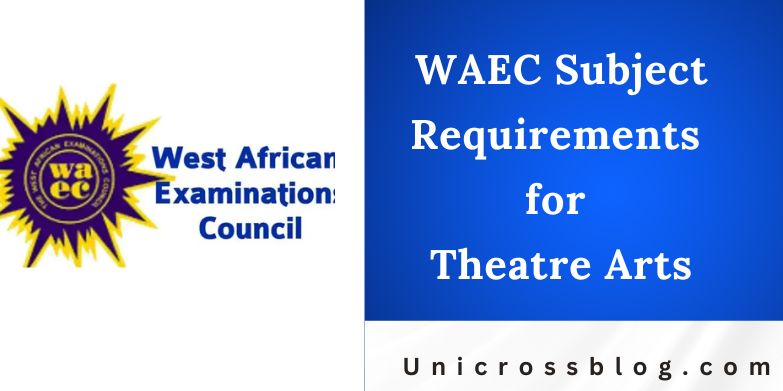Theatre Arts is a dynamic and creative field that prepares students for careers in acting, directing, playwriting, stage design, film production, and cultural performance. In Nigeria, pursuing a degree in Theatre Arts at any university requires meeting specific entry criteria set by the Joint Admissions and Matriculation Board (JAMB) and individual institutions. A key component of this is the West African Examinations Council (WAEC) or equivalent O’level results, where candidates must secure at least five credit passes in relevant subjects. These credits form the foundational academic benchmark, ensuring students have the literacy, analytical, and expressive skills essential for the discipline.
Understanding the WAEC requirements is crucial for aspiring theatre enthusiasts. Failing to align your subject choices can lead to disqualification during screening processes, even with strong JAMB scores. This guide outlines the standard WAEC subjects needed, explains their importance, highlights variations across universities, and offers practical advice for preparation. By focusing on these elements, you can position yourself for success in this vibrant program.

Standard WAEC Subject Requirements
To qualify for Theatre Arts admission, you need a minimum of five O’level credits obtained in not more than two sittings. These must include core subjects that build communication prowess, critical thinking, and cultural awareness, all vital for theatre studies. The universally accepted combination, as endorsed by JAMB, includes:
English Language: This is compulsory for all candidates across faculties. A credit in English ensures proficiency in verbal and written expression, which is indispensable for script analysis, dialogue delivery, and audience engagement in performances.
Literature in English: Often the cornerstone subject for Theatre Arts, this credit is mandatory at most institutions. It equips students with the ability to dissect narratives, themes, and literary devices in plays, novels, and poetry, mirroring the interpretive demands of theatre production.
One Arts Subject: Options here include Government, History, Christian Religious Studies (CRS), Islamic Religious Studies (IRS), or Fine Arts. These foster an understanding of societal structures, ethics, and aesthetics, which enrich character development and historical contextualization in dramatic works.
Two Other Subjects from Arts or Social Sciences: Suitable choices encompass Economics, Commerce, Civic Education, Geography, or a second language like Yoruba, Igbo, or Hausa. These broaden your perspective on human behavior and economics, aiding in the creation of relatable scripts and marketing theatre productions.
Mathematics: While not always emphasized in creative courses, a credit pass in Mathematics is a general WAEC requirement for university admission. It hones logical reasoning, useful for budgeting stage shows or analyzing audience data.
A typical successful WAEC result for Theatre Arts might look like credits in English Language (B3), Literature in English (A1), Government (C4), CRS (B2), and Economics (C5), alongside Mathematics (C6). Remember, grades below C6 in these key areas can hinder your chances, so aim for strong performances.
These requirements apply to WAEC, NECO, GCE, or NABTEB results. If using multiple exams, ensure the combined credits meet the five-subject threshold without exceeding two sittings.
Importance of Each Subject in Theatre Arts
Each required subject contributes uniquely to your growth as a theatre practitioner. English Language transcends mere communication; it underpins improvisation, voice modulation, and scriptwriting, preventing misinterpretations that could derail a live show. Literature in English, meanwhile, immerses you in dramatic traditions from Shakespeare to Wole Soyinka, sharpening your critique of performances and inspiring original works.
Arts subjects like Government or History provide socio-political insights, enabling you to craft stories that reflect Nigeria’s diverse realities, from colonial legacies to contemporary activism. Religious studies such as CRS or IRS add layers of moral and philosophical depth, ideal for exploring themes of faith in plays. Fine Arts, if chosen, introduces visual storytelling through set design and costume conceptualization.
Social science options like Economics teach resource allocation, crucial for independent theatre troupes managing limited funds. Civic Education instills values of citizenship and ethics, promoting inclusive productions that respect cultural sensitivities. Even Mathematics, though seemingly distant, supports technical aspects like lighting calculations or statistical analysis of box office trends.
Selecting the right mix not only satisfies admission criteria but also builds a versatile skill set. For instance, combining Literature with Fine Arts prepares you for multimedia theatre, blending live action with digital elements.
Variations Across Nigerian Universities
While the core WAEC requirements remain consistent, some universities impose nuanced preferences based on their program focus. For example, Ahmadu Bello University (ABU), Bayero University (BU), Plateau State University (PLASU), Kogi State University (KSU), and the University of Ibadan (UI) demand five credits including English, Literature in English, and three others strictly from Arts or Social Sciences, emphasizing a humanities-heavy background.
The University of Uyo (UNIUYO), Benue State University (BSU), Imo State University (IMSU), and the University of Calabar (UNICAL) explicitly require Literature in English alongside English, but allow flexibility in the remaining subjects, accommodating science options like Biology if from an arts stream.
Nnamdi Azikiwe University (UNIZIK) accepts five credits with English and Literature, plus any Arts or Social Science subjects, making it slightly more lenient. The University of Port Harcourt (UNIPORT) and Olabisi Onabanjo University (OOU) mirror JAMB’s standards, prioritizing English, Literature, and Arts subjects without rigid extras.
Always verify with your target institution’s brochure, as post-UTME screenings may weigh Literature heavily. In rare cases, like for Theatre and Media Arts variants at Federal University Oye-Ekiti (FUOYE), an additional language or Arts subject is preferred to support media production skills.
Complementary JAMB UTME Requirements
Though the focus here is WAEC, note that JAMB UTME complements it seamlessly. For Theatre Arts, register for English Language (compulsory), Literature in English, and two other Arts or Social Science subjects such as Government, CRS, or Economics. Aim for a total UTME score of at least 180-200, depending on the university’s cutoff. Direct Entry candidates, with A’level passes in two Arts/Social Science/Science subjects plus the WAEC credits, can bypass UTME.
Preparation Tips for WAEC
Preparing for these subjects demands strategic effort. Start early by enrolling in a WAEC-approved school or tutorial center. Dedicate daily time to Literature, practicing essay writing on prescribed texts like “The Lion and the Jewel” to master thematic analysis. For English, engage in oral drills and comprehension exercises to boost grammar and vocabulary.
Form study groups for Arts subjects, debating historical events or ethical dilemmas to deepen retention. Use past WAEC questions from reliable sources to simulate exam conditions, targeting at least 60% in mocks. If weak in Mathematics, leverage simple apps or tutors focusing on algebra and geometry basics.
Health-wise, balance study with rest; theatre demands stamina, so cultivate habits like reading plays aloud. If retaking WAEC, combine it with NECO for broader coverage. Remedial programs at universities can bridge gaps if you fall short initially.
Career Prospects in Theatre Arts
Beyond requirements, Theatre Arts opens doors to rewarding paths. Graduates become actors in Nollywood, directors for stage festivals like Calabar Carnival, or educators in performing arts schools. Others venture into scriptwriting for TV, event management, or cultural diplomacy. With Nigeria’s booming creative economy, skilled alumni earn from freelance gigs to corporate training roles, blending passion with financial stability.
READ ALSO: WAEC Subject Combination for Marketing
FAQs
Is Literature in English compulsory for WAEC in Theatre Arts?
Yes, nearly all universities require a credit in Literature in English, as it forms the bedrock of dramatic analysis and creativity.
Can I use NECO instead of WAEC for these requirements?
Absolutely; NECO, GCE, or NABTEB results are equally valid, provided you meet the five-credit minimum in two sittings.
What if I have a D7 in Mathematics?
You will need to retake it, as Mathematics is a general requirement. Focus on remedial options to secure a C6 or better.
Does Fine Arts count as an Arts subject?
Yes, it qualifies and is particularly advantageous for students interested in scenic design or visual theatre elements.
How many WAEC subjects should I register for overall?
Typically eight to nine, including the five required credits plus extras like a trade subject for completeness.
Are there waivers for Theatre Arts requirements?
Rarely; JAMB and universities adhere strictly, but Direct Entry via A’levels offers an alternative route.
What grade is needed in English Language?
A minimum C6; higher grades strengthen your application during competitive screenings.







